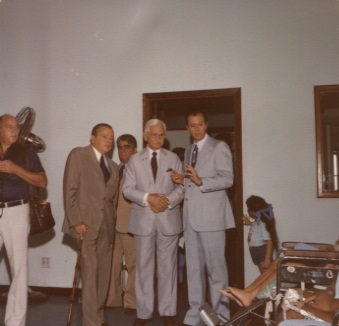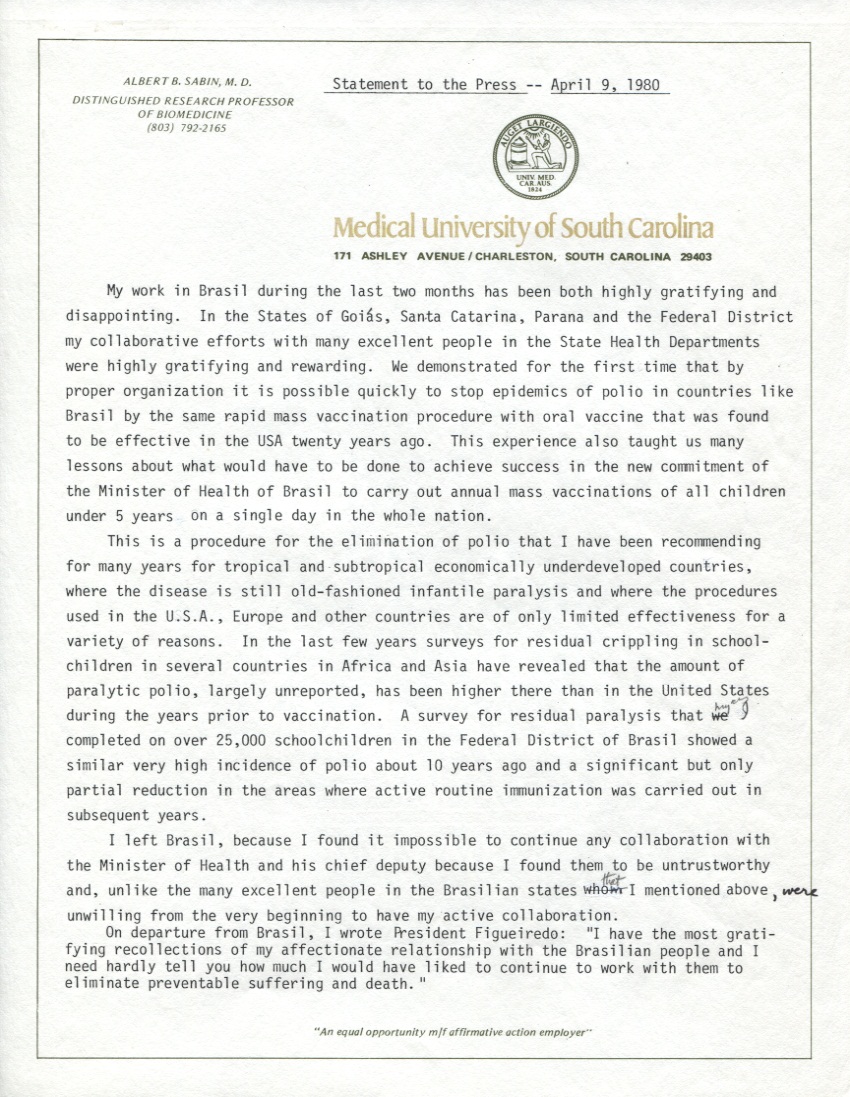Recently, I have been reading Polio, which is a collection of essays edited by Thomas M. Daniel and Frederick C. Robbins. Among the many interesting essays in the book is one by João Baptista Risi, Jr. He describes the different mass vaccination campaigns in Brazil, and in doing so, he discusses Dr. Sabin’s trip to the country in 1980 and its result.
The essay stated that Dr. Sabin offered his assistance to the Brazilian Minister of Health to implement the national vaccination days plan, using the oral polio vaccine. Dr. Sabin was a well-known figure in Brazil and had helped other countries implement vaccination campaigns. According to Risi, “[Sabin] was welcomed with great enthusiasm, as we looked forward to receiving technical advice on particular issues, and his support was necessary to insure public acceptance. Very surprisingly, however, he paid less attention to the proposed vaccination plan and focused special interest on defining more precisely the magnitude of the problem of poliomyelitis in Brazil” (p. 172). Apparently, Dr. Sabin “did not accept objections to his proposal” and left Brazil on an unpleasant note (p. 172).
In our collection, we have a lot of correspondence related to this trip. In a handwritten note that Dr. Sabin addressed to the President of Brazil, he wrote that he was invited by the Ministry of Health to become a consultant and that he agreed to it “only on the condition that [he] would not only give advice but work to see that the advice [Ministro Arcoverde] accepted would be executed.” I am unable to tell if this was the version of the letter that Dr. Sabin actually sent to President João Figueriredo (the typed letter is in Portuguese!), but it does shed some light into Dr. Sabin’s thoughts on the trip.

Sabin visiting the Associação de Assistência à Criança Defeituosa during his trip to Brazil, April 1980
A press release about Dr. Sabin’s trip from the Medical University of South Carolina comments on his “both highly gratifying and disappointing” experience. Dr. Sabin’s official statement was that he left Brazil “because I found it impossible to continue any collaboration with the Minister of Health and his chief deputy because I found them to be untrustworthy and, unlike the many excellent people in the Brasilian states that I mentioned above, were unwilling from the very beginning to have my active collaboration.” In a letter to Governador Jorge Konder Bornhausen, with whom Dr. Sabin collaborated with in Santa Catarina, he wrote, “I appreciated very much all the kind things you said in your letter, especially because since my return from Florianópolis, Ministro Arcoverde’s behavior toward me became so degrading and discourteous that I knew that it would not be possible for me to continue work[…]” Dr. Ivan Ferraretto, of the Associação de Assistência à Criança Defeituosa in Brazil, wrote to Dr. Sabin, “Your presence in Brazil helped to show all the Brazilian people that the Public Health in our country have [sic] a long way to go, but we can learn from our mistakes – not only from our successes.”
After Dr. Sabin’s return, many newspapers ran a story about his trip and the roadblocks he encountered. Some of these headlines read, “Disillusioned Dr. Sabin Returns From Polio-Plagued Brazil,” “Anti-Bureaucrat Vaccine,” and “Brazil Slams the Door on Sabin Over Polio Disclosure.” Of the last headline, however, Dr. Sabin wrote to a colleague, “While the headline […] may apply to the Ministry of Health, it certainly does not apply to the rest of Brasil. The appropriate headline for the rest of Brasil would be ‘Brasil Opens its Heart to Dr. Sabin’ because of the extraordinary outpouring of sympathy on the part of the important newspapers in Brasil, professional organization, and ‘the people in the street.’”
Returning to the chapter by Risi, he looked back at the event by saying, “[T]his troublesome episode was helpful in the sense of emphasizing the importance of poliomyelitis and the need for immediate action to be taken, thus speeding up the mobilization activities” (p. 172-73). In 1994, Brazil was declared polio-free by its Ministry of Health and the International Commission for the Certification of Poliomyelitis Eradication in Americas. Looking back, Risi concluded that the Brazilian effort to eradicate polio helped them institute national vaccination days for other diseases (p. 179).
Overall, I thought it was interesting to see two different points of view on the same event – Dr. Sabin’s 1980 trip to Brazil. As I discover more correspondence that relates to published articles and books, I will feature it on this blog. I hope historians interested in researching such topics will find much grist-for-the-mill in the 35,000 documents from Dr. Sabin’s archive that will soon be freely and broadly available via the internet.
Notes: Polio by Daniel & Robbins is part of the Winkler Center collection (WC 555 P768m 1997). The letters in the Winkler Center collection discussed in this post are in Series #9 – Poliomyelitis; Box #7 – International Cooperation, Brazil; Folder #14 – March-April 1980, Correspondence.
In 2010, the University of Cincinnati Libraries received a $314,258 grant from the National Endowment for the Humanities (NEH) to digitize the correspondence and photographs of Dr. Albert B. Sabin. This digitization project has been designated a NEH “We the People” project, an initiative to encourage and strengthen the teaching, study, and understanding of American history and culture through the support of projects that explore significant events and themes in our nation’s history and culture and that advance knowledge of the principles that define America. Any views, findings, conclusions, or recommendations expressed in this blog do not necessarily reflect those of the National Endowment for the Humanities.

